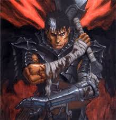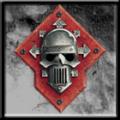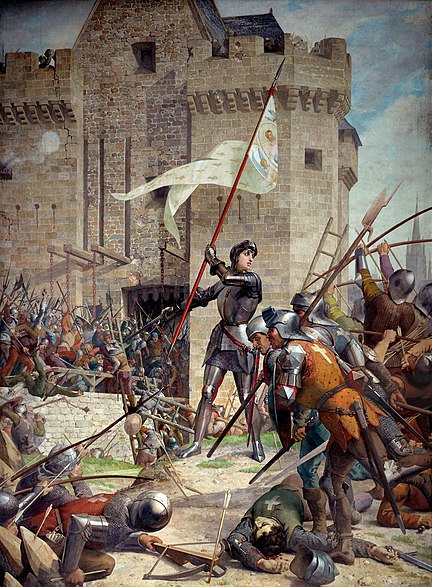17923
Post by: Asherian Command
Okay Dakka Dakka, I know all of us love History in some compacity or another. What is your most favorite historical battle or event That is not in the 20th, or 21st century.
(SO NO WORLD WARs) Please explain why... And historical accounts that might interest people.
Please keep it on topic.
My most favorite historical event was the 2nd Punic War.
Why? Because it is an incredible war, Where the greatest Military Tactician Hannibal kicked the Romans off their high horse. Blood Oaths, Father and Sons fighting each other. It is a fantastic historical lesson.
53375
Post by: hotsauceman1
I have to say my favorite are WW2 Navel conflicts. I listened to my grandpa tell me how he flew a plane(I cant remember what type though) In the war. I even collect WW2 tanks and models.
On a side note, I even have my Grandpas WW2-Korean War Vet hat with all his rewards on it.
17923
Post by: Asherian Command
 hotsauceman1 wrote: hotsauceman1 wrote:I have to say my favorite are WW2 Navel conflicts. I listened to my grandpa tell me how he flew a plane(I cant remember what type though) In the war. I even collect WW2 tanks and models.
On a side note, I even have my Grandpas WW2-Korean War Vet hat with all his rewards on it.
Ahem....
That is not in the 20th, or 21st century.
(SO NO WORLD WARs)
50512
Post by: Jihadin
American Civil War.
21720
Post by: LordofHats
I'm no real fan of reading Early American history but there are some cool books I got to read on the subject. There's a good book on the early years of the American Presidency (mostly about the first few presidents and their elections) called America Afire: Adams, Jefferson, and the Revolutionary Election of 1800 by Bernard A. Weisberger. An awesome book for an overview of the period and the people involved. Never before had I so pitied poor Alexander Hamilton.
There's also American Slavery: 1619-1877 by Peter Kolchin, a book covering Slavery in America from its inception to its end. How slavery affected US culture and politics. A very good concise and brief survey on an institution across two centuries.
For anyone interested in Environmental History, I suggest Mosquito Empires: Ecology and War in the Greater Caribbean, 1620 by J.R. McNeill. It's amazing how a small insect vastly influenced the time period of early colonialism and beyond. There's also the Lost Wolves of Japan by Brett L Walker, which studies the history of the Japanese Wolf and its extinction. Another great book in this area is Nature's New Deal: The Civilian Conservation Corps and the Roots of the American Environmental Movement by Neil M. Maher, a study of the Civilian Conservation Corp, the birth of Environmentalism in the US and the origin of much of our National Parks and landmarks.
For those interested in turn of the century there's also the classic The Fighting Ships of the Rising Sun: The Drama of the Imperial Japanese Navy, 1895-1945 by Stephen Howarth. It's a little dated at this point, and not entirely correct (it was written back in the 80's) but its still a standard text for the Imperial Japanese Navy and its history.
For anyone who likes Vietnam I always recommend Mark Moyar's book Triumph Forsaken: The Vietnam War, 1954-1965.
72304
Post by: ThePrimordial
I'm a big fan of the gak that Audie Murphy pulled. I think he had a KD of like 300-1. And he died in a plain crash.
But because I'm not allowed, I'm a big fan of Alexander the Great's wars. In particular one that shows his skill as a general was one where the enemy had him outnumbered 1.5 to 1 (battle of issus) and he won by trolling Darius by charging him, breaking the Persian lines, and making the battle a slaughter in favor of the Macedonians.
Another is the battle of Stamford Bridge, where a single Norse hero, killed 40 Englishmen on the titular bridge before finally being brought down by a cheapshot to his boys. That happened.
Another would be in a time where the Pope would rule as long as there was no Emperor, and was sovereign over the king. And only the Pope could make someone the Emperor. So naturally he wanted to keep his power. So Charlemagne wins countless battles, takes more and more land, even his enemies think he's fair, and his people love him. But the pope wants his power. So Charlemagne in the middle of a raid on the city, tells the Pope that he'll be to blame if the armies aren't rallied. So Charlemagne is made emperor.
53251
Post by: xole
There was this time 10,000 years ago or so that a bunch of tribesmen killed a bunch of other tribesmen. I thought they were pretty creative at solving their differences.
72304
Post by: ThePrimordial
 xole wrote: xole wrote:There was this time 10,000 years ago or so that a bunch of tribesmen killed a bunch of other tribesmen. I thought they were pretty creative at solving their differences.
Aren't we talking about specific instances?
The time period for this seems a little off to, for this to be the norm. Villages were already starting to form.
34644
Post by: Mr Nobody
Dinosaurs were pretty cool.
33125
Post by: Seaward
I'm all about anything Age of Sail-related. I've still got the memorabilia my dad brought me when I was a kid from when he had dinner aboard the Victory.
121
Post by: Relapse
Yep, I have a pile of letters and pictures covering three years worth of the war from a twice great uncle that fought for the North. There are some real eye opening insights to be had reading them.
5534
Post by: dogma
 LordofHats wrote: LordofHats wrote:I'm no real fan of reading Early American history but there are some cool books I got to read on the subject.
I assume that one of them was Farmers & Fisherman: Two Centuries of Work in Essex County.
As to the period I find most interesting: probably the various conquests of Genghis Khan.
21720
Post by: LordofHats
 dogma wrote: dogma wrote: LordofHats wrote: LordofHats wrote:I'm no real fan of reading Early American history but there are some cool books I got to read on the subject.
I assume that one of them was Farmers & Fisherman: Two Centuries of Work in Essex County.
Nope but its blurb sure makes it sound interesting.
5534
Post by: dogma
Be careful not to plagiarize it.
55107
Post by: ScootyPuffJunior
I am also a fan of the American Civil War. Being from Virginia, I had family on my mother's side that fought for the South. I also live near quite a few famous historical sites, including some John Mosby sites (he is a personal favorite figure of mine).
I also interested in the Greco-Persian Wars. Aside from the Battle of Thermopylae that everyone knows, there are some truly amazing battles: Salamis, Plataea, and Marathon (from the first Persian invasion). All such fascinating stuff!
5470
Post by: sebster
The French invasion of Russia has my interest right now. Just overtaken the French Indian wars. Interesting that the thread is about history, but it's stated that we are to state the battle we're most interested in- we couldn't think the renaissance or the industrial revolution was our most interesting point or, well, anything that wasn't about people fighting. Also interesting is that I was going to name a military campaign anyway 
21720
Post by: LordofHats
 sebster wrote: sebster wrote:Interesting that the thread is about history, but it's stated that we are to state the battle we're most interested in- we couldn't think the renaissance or the industrial revolution was our most interesting point or, well, anything that wasn't about people fighting.
I blame all the violence on television.
5470
Post by: sebster
I blame the shutdown. Which means it's really all because of Obamacare, and therefore by extension the fault of Kenya.
21720
Post by: LordofHats
 sebster wrote: sebster wrote:
I blame the shutdown. Which means it's really all because of Obamacare, and therefore by extension the fault of Kenya.
In the spirit of this thread and it being Kenya's fault I give you the Tsavo Maneaters. The Beast of Gevuaden of Kenya 
21940
Post by: nels1031
The Reconquista era always intrigued me. I actually have a painting of the Surrender of Granada in my home office.
55600
Post by: Kovnik Obama
 Asherian Command wrote: Asherian Command wrote:What is your most favorite historical battle or event That is not in the 20th, or 21st century.
I. The writing of Hammurabi's Code, because it is one of the first instances of legal activity, and, everything considered, pretty cool. Also, because the words 'Lex Talionis' just sounds so fething cool. II. 451 B.C, The writing of the XII Tables, because it's the first civil code. III. Roughly 1850-1902, the works of Frege, Brentano, Meinong, Stumpf, Ehrenfels and Husserl. The philosophical culture of Austria and Vienna in particular IV. 1957, at the Cornell Aeronautical Institute (I cheat but it's still history), Frank Rosenblatt discovered the oddly-named perceptron, an algorithm basically representing what the simplest neural networks can acheive. This guy opened up a whole new box.
5470
Post by: sebster
Those lions were personally responsible for The Ghost and the Darkness, which somehow made lions eating dudes and other dudes hunting said lions one of the most boring things I've ever had to sit through. Val Kilmer has paid his dues, because he's really fat now, but those lions pretty much got away with it scot-free.
21720
Post by: LordofHats
Speaking of man-eating lions does anyone else seek out weird stories of History? Tsavo Man-Eaters, the Beast of Gevuaden, Roanoke Colony, the mysterious death of Silas Deane, and the like? Those not so huge but interesting events that happen?
Recently, and I blame the alien thread for this, I've been skimming up on the history of UFO's. I never even knew Project Blue Book existed, let alone some of the weird stuff the USAF investigated in connection with those flying unknowns.
53251
Post by: xole
 ThePrimordial wrote: ThePrimordial wrote: xole wrote: xole wrote:There was this time 10,000 years ago or so that a bunch of tribesmen killed a bunch of other tribesmen. I thought they were pretty creative at solving their differences.
Aren't we talking about specific instances?
The time period for this seems a little off to, for this to be the norm. Villages were already starting to form.
I am, my dates were a little off
And besides, villages don't negate tribes. We still have tribes.
And if this degenerates into an argument about the definitions of the words "village" and "tribe" I'm out. Mondays are bad enough as it is.
17923
Post by: Asherian Command
 sebster wrote: sebster wrote:The French invasion of Russia has my interest right now. Just overtaken the French Indian wars.
Interesting that the thread is about history, but it's stated that we are to state the battle we're most interested in- we couldn't think the renaissance or the industrial revolution was our most interesting point or, well, anything that wasn't about people fighting.
Also interesting is that I was going to name a military campaign anyway 
I did say Events. 
Battles or Events
221
Post by: Frazzled
Pre Columbian Central and South American history, especially the ancient Maya.
Initial culture / fixed settlements in northern Yucatan is now set at 2,500BC. Interesting things include evidence of a strong middle class, and 3 football field wide raised plaza akin to the bottom half of one ofthe great pyramids of Egypt.
5212
Post by: Gitzbitah
 ThePrimordial wrote: ThePrimordial wrote:
Another is the battle of Stamford Bridge, where a single Norse hero, killed 40 Englishmen on the titular bridge before finally being brought down by a cheapshot to his boys. That happened.
I loved badass of the week's treatment of that story. It just seemed such an appropriate medium for that story.
Honestly, any recorded Viking story is blended so thoroughly with myth that it becomes positively epic. Though I have a soft spot for the heretics urged to repent by Joan of Arc herself, the Hussite Rebellion. Jan Zizka- who led an army of peasants to build tanks in the age of crossbows and arquebusses, developed circling the wagons before the cowboys were a gleam in Columbus's eye, and apparently rode into battle victoriously having lost not one, but both of his eyes.
edited for typo
21049
Post by: kamakazepanda
Early and High Middle ages.
Something about the period has always grabbed me, but really any period that is not the first world war interests me.
Particular event?
The Crusades.
1206
Post by: Easy E
Lately I hav ebeen interested in the 1862 Lakota Uprising for a couple of reasons.
1. It's local
2. It had a 150 year anniversary recently so was getting a lot of local attention
3. It was a distraction during the ACW
3. I want to game it at my local History center
27391
Post by: purplefood
The Industrial revolution was pretty interesting... either than or school tricked/brainwashed me into thinking that.
The roman empire is also pretty interesting as were the 1500's.
1206
Post by: Easy E
 LordofHats wrote: LordofHats wrote:Speaking of man-eating lions does anyone else seek out weird stories of History? Tsavo Man-Eaters, the Beast of Gevuaden, Roanoke Colony, the mysterious death of Silas Deane, and the like? Those not so huge but interesting events that happen?
Recently, and I blame the alien thread for this, I've been skimming up on the history of UFO's. I never even knew Project Blue Book existed, let alone some of the weird stuff the USAF investigated in connection with those flying unknowns.
Yeah, I know a few things about that from when I was a pre-teen. I voraciously read about UFOs, the paranormal, and cryptozoology (i.e. Monsters). I liked the famous Bermuda Trianle story about the lost squadron of dive bombers, the Mary Celeste, and lake monsters in places other than Loch Ness (Lake Champlain, Lake Ogopogo, Lake Pepin, etc.).
51489
Post by: necrovamp
I quite like 'The Glorious Revolution' That period in England the led up to the Civil War. You cannot really understand the Civil War until you study what King Charles the first actually did to parliament and what happened when parliament responded. There is also the founding of the constitutional monarchy and the new parliament, the foundation for the system we have today. The war in Ireland after the Civil War (usually this gets lumped in with the Civil War, but in my opinion is a separate Issue, much like Afghanistan is a separate Issue to Iraq) and it's consequences are also worth studying to understand the relationship between Ireland and mainland Britain today, since it was at this point when the English Protestants went over and settled in Ireland. The Civil War, the period before and after it gives one an understanding on the political situation of Britain today. If you want to find out where modern Britain originated this is the period to study.
I could go on about it.
I also have a 'thing' for the American Civil War. not sure why but it vastly fascinates me. I studied it for my degree, and it has fascinated me so I carried on the subject, and now have 2 wargaming armies and a dissertation on Robert E Lee, that many Southerners will probably not like.
I also have a soft spot for the wars of the roses, but then it's the period I re enact. To me the medieval world was a different world from the one we live in, and I want to find out (if at all possible) what made the people tick, why the various systems were in place, how people felt under these systems and what caused them to behave the way they behaved.
77217
Post by: xruslanx
The battle of Thermopylae. Perfect example of Spartan military prowess.
37231
Post by: d-usa
 Frazzled wrote: Frazzled wrote:Pre Columbian Central and South American history, especially the ancient Maya.
Initial culture / fixed settlements in northern Yucatan is now set at 2,500BC. Interesting things include evidence of a strong middle class, and 3 football field wide raised plaza akin to the bottom half of one ofthe great pyramids of Egypt.
I'm sorry, you didn't list the Battle of the Alamo.
Please turn in your Texas Flag and present for mandatory relocation to Oklahoma. 
21499
Post by: Mr. Burning
The beginning of the 1500's In Europe.
Some bloke called Michelangelo carves up a block of marble. He ends up with a representation of David.
Artists viewing the David at its current home in The Academia - Florence - Still weep that they cannot produce something as beautiful.
54011
Post by: fluffstalker
 sebster wrote: sebster wrote:The French invasion of Russia has my interest right now. Just overtaken the French Indian wars.
Interesting that the thread is about history, but it's stated that we are to state the battle we're most interested in- we couldn't think the renaissance or the industrial revolution was our most interesting point or, well, anything that wasn't about people fighting.
Also interesting is that I was going to name a military campaign anyway 
Well, you are on a wargaming forum. Most of the people here, me included, will find military conflict interesting.
25220
Post by: WarOne
I would say the invention of the automobile would be a significant event.
25208
Post by: AlmightyWalrus
Chungmugong Yi Sun-sin and his 13 ships against more than 300 Japanese ships. The poor Japanese never knew what hit them.
221
Post by: Frazzled
 d-usa wrote: d-usa wrote: Frazzled wrote: Frazzled wrote:Pre Columbian Central and South American history, especially the ancient Maya.
Initial culture / fixed settlements in northern Yucatan is now set at 2,500BC. Interesting things include evidence of a strong middle class, and 3 football field wide raised plaza akin to the bottom half of one ofthe great pyramids of Egypt.
I'm sorry, you didn't list the Battle of the Alamo.
Please turn in your Texas Flag and present for mandatory relocation to Oklahoma. 
Thats not a battle. Thats a religious experience for all Texans. I have made the Hajj to the Mission De Bejar six times infidel.
77159
Post by: Paradigm
In general I am fascinated with anything historical, but in the last couple of years I've developed a particular fascination with 19th century Europe and Russia (going into the 20th with the latter), entailing the fall of two major monarchies and really creating the international system we have today. Its a fascinating period militarily with the Napoleonic wars, the Russian expansions and the Crimean and Russo-Japanese wars, but also industrially and socially with the first real development of 'modern' systems of industry and farming, bringing with them an entirely new social and economic structure. Politically you also have the major Europe-wide shift from Monarchies to (at least in name) democratic systems. 1848 is particularly interesting, with revolution across Europe.
Other areas of particular interest are both World Wars, and ancient history (Roman, Greek, Egyptian). That said, anything remotely historical I'll take an interest in.
7013
Post by: Ifurita
 ScootyPuffJunior wrote: ScootyPuffJunior wrote:I am also a fan of the American Civil War. Being from Virginia, I had family on my mother's side that fought for the South. I also live near quite a few famous historical sites, including some John Mosby sites (he is a personal favorite figure of mine).
Reading a book about him right now, Gray Ghost: The Life of Col. John Singleton Mosby
38860
Post by: MrDwhitey
 necrovamp wrote: necrovamp wrote: and a dissertation on Robert E Lee, that many Southerners will probably not like.
Well if it has any basis in reality it probably wasn't flattering. 
514
Post by: Orlanth
Late Roman Republic 1st century BC.
Fascinating times from long ago yet known in lurid detail.
11892
Post by: Shadowbrand
1066. That era of time is easily my favorite to follow and learn about. Next to say the days of the Roman Empire and the Wild West.
Plus the tale of Stamford bridge really rocks my socks.
51489
Post by: necrovamp
 MrDwhitey wrote: MrDwhitey wrote: necrovamp wrote: necrovamp wrote: and a dissertation on Robert E Lee, that many Southerners will probably not like.
Well if it has any basis in reality it probably wasn't flattering. 
It was about how he is remembered, really debunking the myths that he was the best American general and how he is twisted by various people to their own views rather than shown as the man he was among other things. Example would be repeating the mistake he made at Malvern Hill at Gettysburg (Pickets charge, at Malvern hill he charged over open ground towards dug in Union troops and artillery and was defeated, he did the same thing at Gettysburg, just on a bigger scale) My personal view being it was a case of Union generals being worse than him, rather than Lee's own skill that got him as far as he got.
sorry i'm rambling!
38860
Post by: MrDwhitey
You're rambling to someone who fully agrees with you, so it's ok. 
73007
Post by: Grimskul
Definitely the Reformation in terms of religious significance.
In terms of actual battles, the Franco-Prussian War was pretty damn awesome. Bismark truly earned the title of the Iron Chancellor. Everything was fine until that dope Kaiser Wilhelm ruined everything he helped build Germany up to 
Other than that probably the Opium War, really shows how far the Qing dynasty had fallen in terms of political and military stability since their peak with the Emperor Kangxi. That plus the fact that they lost was more due to internal reasons such as the Taipeng Rebellions than simply the Brits being stronger technologically or military-wise.
65628
Post by: welshhoppo
I do love a good Roman War, the second Punic war will always stand out for me in terms of sheer badassery
*Well Hannibal has no way into Italia, he can't cross the sea with us around!*
But I'm also a fan of the Persian Empire, I'm currently studying Darius I of Persia, which is an excellent period full of brilliant warfare, such as the Battle of Marathon, and excellent administrative ideas, such as divided the worlds largest Empire into manageable chunks that could be easily controlled from a central power.
23
Post by: djones520
I'm currently reading on the Crusades. Just read a good book on Vikings, and before that a lot on the Revolutionary War.
51489
Post by: necrovamp
welshhoppo wrote:I do love a good Roman War, the second Punic war will always stand out for me in terms of sheer badassery
*Well Hannibal has no way into Italia, he can't cross the sea with us around!*
But I'm also a fan of the Persian Empire, I'm currently studying Darius I of Persia, which is an excellent period full of brilliant warfare, such as the Battle of Marathon, and excellent administrative ideas, such as divided the worlds largest Empire into manageable chunks that could be easily controlled from a central power.
If you like historic fiction have you tried the 'Emperor' series by Conn Igulden. It's a 4 book series all about the rise of Julius Ceaser, and while it's fiction, it's more a dramatization then a novel. It is a very very very good series.
And i'm glad someone agress wih me MrDwhitey
72304
Post by: ThePrimordial
 Frazzled wrote: Frazzled wrote: d-usa wrote: d-usa wrote: Frazzled wrote: Frazzled wrote:Pre Columbian Central and South American history, especially the ancient Maya.
Initial culture / fixed settlements in northern Yucatan is now set at 2,500BC. Interesting things include evidence of a strong middle class, and 3 football field wide raised plaza akin to the bottom half of one ofthe great pyramids of Egypt.
I'm sorry, you didn't list the Battle of the Alamo.
Please turn in your Texas Flag and present for mandatory relocation to Oklahoma. 
Thats not a battle. Thats a religious experience for all Texans. I have made the Hajj to the Mission De Bejar six times infidel.
I want to sig this so bad. Can I? Automatically Appended Next Post:  Shadowbrand wrote: Shadowbrand wrote:1066. That era of time is easily my favorite to follow and learn about. Next to say the days of the Roman Empire and the Wild West.
Plus the tale of Stamford bridge really rocks my socks.
Already called it. In the end the Norse hero gets killed by a cheapshot to his boys after killing 40+ Englishmen over a half hour period.
50512
Post by: Jihadin
DJ. I got my hook on Crusades from Youtube. So pretty much went over 1st, 2nd and 3rd Crusades.
5470
Post by: sebster
Ah, my mistake 
61627
Post by: KalashnikovMarine
The Golden Age of Piracy was pants gakkingly awesome.
Ghengis Khan is my personal hero, and the final evidence that Alexander the Great should be renamed "Alexander the Lucky To Be Remembered He Sucked So Hard" sure it's a mouthful but the little wimp barely ruled even a majority of a continent and his empire endured less then the scent of a taco fart after his death.
Finally, most people don't realize that most of the lines in the movie 300 are goddamn quotes.
After invading Greece and forcing the submission of many city states, Philip II, King of Macedon sent a message to the Spartans. "You are advised to submit without further delay, for if I bring my army into your land, I will destroy your farms, slay your people and raze your city." The Spartan rulers replied with only one word. "If". Philip of Macedon and his son Alexander the Mildly Incompetent both avoided Sparta completely.
When asked by a woman from Attica:
'Why are you Spartan women the only ones who can rule men?',
she said:'Because we are also the only ones who give birth to men.'
- Queen Gorgo (daughter of Kleomenes I, born ~506. Married Leonidas I)
When the Persians sent envoys to the Spartans demanding the traditional symbol of surrender, an offering of soil and water, the Spartans threw them into a deep well, suggesting that upon their arrival at the bottom, they could "Dig it out for yourselves."*
When Leonidas was asked why he had come to fight such a huge host with so few men, Leonidas answered, "If numbers are what matters, all Greece cannot match a small part of that army; but if courage is what counts, this number is sufficient." On being again asked a similar question, he replied, "I have plenty, since they are all to be slain."
Another classic line from the movie with historical fact behind it. the Spartan Dienekes was told that the Persian archers were so numerous that when they fired their volleys, their arrows would blot out the sun. He responded with “So much the better, we'll fight in the shade” this response is now the motto of the Hellenic Army's 20th armored division.
Before the battle of Termoplylae Xerxes sent an offer to King Leonidas that he would spare his men if they gave up their arms. Leonidas replied "Molon labe" (Greek: Μολών λαβέ), which translates to "Come and take them".
The Etipath of the 300
Ὦ ξεῖν', ἀγγέλλειν Λακεδαιμονίοις ὅτι τῇδε
κείμεθα, τοῖς κείνων ῥήμασι πειθόμενοι.
Ō ksein', angellein Lakedaimoniois hoti tēide
keimetha, tois keinōn rhēmasi peithomenoi.
"Go and tell the Spartans, stranger passing by,
That here, obedient to their laws, we lie."
*Holy Feth, the original line was MORE badass.
22289
Post by: EmilCrane
My dissertation is only early modern naval history, so I can highlight a few key events.
The Spanish Armada- While the Royal Navy actually didn't contribute much to the end of the Armada, its destruction heralded the beginning of the end for Spain as a Great Power.
Battle of Traflagar- This battle, as much as any other, determined the course of early modern history. By the end the Royal Navy were the undisputed masters of the sea and for the next 100 years England dominated the course of history.
Battle of Hampton Roads- The first confrontation between iron hulled warships. Overnight the world's navies were rendered obsolete, and the world began an arms race that led to WW1.
Battle of Manila Bay- America proves that it can play with the big boys and wipes out a spanish squadron in Manila.
Battle of Tushima- The only time one battleship fleet decisively defeated another. Proved the effectiveness of long range gunnery and torpedoes and secured Japan as a Great Power. Led to the development of Dreadnoughts.
The World Wars had several important battles as well, Jutland, and Midway were probably the most important.
Other one to mention is Operation Praying Mantis, a US-Iranian Navy battle in the Persian Gulf. Its important because its the only major fleet action since WW2 and gives us an idea what a major modern fleet action would look like.
52036
Post by: The Crusader
Battle of Waterloo, If World Wars aren't allowed. The British Army routed the Old Guard, famed for either never losing a battle or never running away, I don't remember which. Also the battle that named all the Guards Regiments of Foot.
In joint second is the Hundred Years War and the War of Independence. Namely because The Black Prince not only went on a rampage through the France and then beat a numerically superior French force, It was the war in which the Order of the Garter decimated the French Order of the Sun.
The War of Independence is fascinating because of the propaganda and stigma attached to it. For anyone interested, Rebels & Redcoats by Hugh Bicheno is a very enlightening book. A little hard going at times but very good.
47598
Post by: motyak
 The Crusader wrote: The Crusader wrote:Battle of Waterloo, If World Wars aren't allowed. The British Army routed the Old Guard, famed for either never losing a battle or never running away, I don't remember which. Also the battle that named all the Guards Regiments of Foot.
\
To be fair there were other nationalities present at Quatre Bras and Waterloo in the British half of the army, and there was also the impending Prussian assault which was weighing on the French. But I agree, it's a fascinating campaign in general. The Peninsular Campaign is brilliant as well.
39335
Post by: commisar rhodes
For me its the fall of Constantinople by the ottoman empire a pretty significant point in history especially as it was pretty much the end of the Byzantine's and there were some very cool strategy used in the siege.
61627
Post by: KalashnikovMarine
Some other important battles.
The Battle of the Cowpens - American Revolution: A relatively small engagement, this battle is important because it is cite-able evidence of Washington's tactical skills, with George himself forced to focus on strategic concerns over pure tactical engagement, George's reputation for losing is unjustified. We can however look to Colonial Army Brigadier General Daniel Morgan, the commanding officer at the Battle of the Cowpens, who by his own admission learned everything he knew as Washington's aide with the British army during the French and Indian Wars, and later a one of his picked officers through out the course of the revolution.
On the date of battle BG Morgan had a force of around 800 men. A mix of Colonial regulars, militia and a small force of cavalry. His opponent? Colonel Banastre Tarleton and his force of 1000+ British regulars, with a force of 300 cavalrymen and a 24 gun battery of artillery, a much better equipped force then Morgan's. Tarleton (aka the bad guy from The Patriot. Seriously) was a cavalry man so those 300 dragoons are important. You can research the details but Morgan played his own weaknesses (namely the militia) and Tarleton's weaknesses (Disdain for militia, being British) off each other and pulled off a classic double envelopment. Tarleton himself barely escaped and a force of 1000+ of the British Army's elite (Dragoons, Highlanders Royal Fusiliers, etc) were either killed, wounded or captured, striking a powerful blow to Cornwallis in the South, and providing the Continental Army with a much needed moral boost.
-------------------
The Battle of Antietam - American Civil War
This engagement beyond being the bloodiest single day in American history, was the vital turning point of the entire Civil war. Had McClellan actually had pair and pursued after defeating Lee's Army of Northern Virginia the war could have been over much sooner turning an important defeat into a complete route.
However the battle remains absolutely vital. The Union victory just south of Sharpsburg's effects on the social and political aspects of war were almost more important then the vital blunting of Lee's attack into the north. The victory provided a much needed moral boost for both civilian and soldier a like, while again throwing Lee's army of Northern Virginia back into Northern Virginia. It also delayed the possibility of foreign intervention, as the British policy was to wait for a "clear winner". Lincoln used every second of this delay, and this new found high spirits, securing the upcoming elections in Congress for the Republicans, which gave him (Lincoln) the fuel to issue the Emancipation Proclamation, which ended all specter of foreign intervention in the American Civil War. (The British population in particular didn't much like that sound of helping slavers. Good on you 18th Century British types)
38860
Post by: MrDwhitey
Asking a British person for their thoughts on Waterloo is often a useless exercise as they seem taken up with mindless and incorrect nationalism over it.
Very Anglo-centric historians full of crap on that one have doomed us all.
Also the Old Guard did not attack and be routed, that was the Middle Guard (who were apparently woefully equipped, using bits of string as slings for example). The French routed en-masse shortly after due to the massive force of blue coated chaps that had appeared on one flank and started shooting, and who actually decided the outcome of the battle.
1206
Post by: Easy E
 EmilCrane wrote: EmilCrane wrote:My dissertation is only early modern naval history, so I can highlight a few key events.
Battle of Tushima- The only time one battleship fleet decisively defeated another. Proved the effectiveness of long range gunnery and torpedoes and secured Japan as a Great Power. Led to the development of Dreadnoughts.
The World Wars had several important battles as well, Jutland, and Midway were probably the most important.
Other one to mention is Operation Praying Mantis, a US-Iranian Navy battle in the Persian Gulf. Its important because its the only major fleet action since WW2 and gives us an idea what a major modern fleet action would look like.
I also find Jutland and Tsushima Straits very interesting.
You may also be interested in the battle of the Yalu River where Chinese Battleships have to fend off attacking Japanese Cruisers. This battle occurred prior to Tsushima, as par tof the Sino-Japanese war. Naval warfare doesn't have nearly as much "stuff" written about it as land war.
WWI Aviation is also interesting to me, but that is apparently not history.
47598
Post by: motyak
But then saying that ignores the effort that the allied forces on the field put in to hold on through the waves of French assault. It wasn't a British victory, or a Prussian victory, or a Dutch-Belgian victory, it was an allied victory.
38860
Post by: MrDwhitey
Saying that the Prussian arrival decided the outcome does not mean "They won Waterloo singlehandedly, and everyone else was just there to watch"*, and I in no way wish to come across as saying that either, but without them the chances of the battle being lost were actually quite high, which is why Napoleon had done his best to split the two armies up.
*The problem is so many tellings of Waterloo have literally been that fantasy of "one nationality did it all", though. Except replace "Prussians" with "British".
27391
Post by: purplefood
There were something like 7 official nations in that army weren't there?
Probably several dozen if you were to look at the rank and file troops.
38860
Post by: MrDwhitey
The Allies were made up of Britain, Prussian, Dutch, Hannover, Brunswick and Nassau, and probably a great deal more nationalities were represented on a smaller scale .
I think what angers me most is not how in a lot of recounts of the events British soldiers are bigged up massively, but how the authors feel the need to really denigrate the other nations. Frankly I learned that all dutch people are cowards who run at the first sight of the enemy, to be roundly mocked by their non-plussed, stoic redcoated allies.
47598
Post by: motyak
 MrDwhitey wrote: MrDwhitey wrote:Saying that the Prussian arrival decided the outcome does not mean "They won Waterloo singlehandedly, and everyone else was just there to watch"*, and I in no way wish to come across as saying that either, but without them the chances of the battle being lost were actually quite high, which is why Napoleon had done his best to split the two armies up.
*The problem is so many tellings of Waterloo have literally been that fantasy of "one nationality did it all", though. Except replace "Prussians" with "British".
I think I was agreeing with that point  at least I was trying to. It was an allied victory as I said, not any one nation in particular.
38860
Post by: MrDwhitey
It's a subject that annoys me, as you might guess. 

Almost as much as the hero worship of that useless, cretinous little bugger Paul Revere.
27391
Post by: purplefood
 MrDwhitey wrote: MrDwhitey wrote:The Allies were made up of Britain, Prussian, Dutch, Hannover, Brunswick and Nassau, and probably a great deal more nationalities were represented on a smaller scale .
I think what angers me most is not how in a lot of recounts of the events British soldiers are bigged up massively, but how the authors feel the need to really denigrate the other nations. Frankly I learned that all dutch people are cowards who run at the first sight of the enemy, to be roundly mocked by their non-plussed, stoic redcoated allies.
That was a weird thing...
It's like all the people who wrote the accounts hated the Dutch or something...
61627
Post by: KalashnikovMarine
Really who doesn't hate the dutch?
1206
Post by: Easy E
There are two things I can't stand, people who are intolerant of other people's culturre; and the Dutch.
514
Post by: Orlanth
 MrDwhitey wrote: MrDwhitey wrote:Saying that the Prussian arrival decided the outcome does not mean "They won Waterloo singlehandedly, and everyone else was just there to watch"*, and I in no way wish to come across as saying that either, but without them the chances of the battle being lost were actually quite high, which is why Napoleon had done his best to split the two armies up.
*The problem is so many tellings of Waterloo have literally been that fantasy of "one nationality did it all", though. Except replace "Prussians" with "British".
You have to place things in perspective.
The Dutch 'tactically withdrew' early in the battle, Wellington expected this and placed the Prince of Oranges troops where a rout would not be catastrophic. When those troops fled to Brussels they announced a French victory which set the city into a panic.
A lot of the Anglo-Allied army were not British and did pull their weight spectacularly, Brunswickers and Hannoverians or instance. However while the battle ended because Blucher kept his promise to stand and fight to Wellington and retreated South rather than East after Ligny and Blucher certainly saved Wellington from defeat.
However...
Wellingtons army held against superior numbers, playing for time and were down to the last of their ammo before relief arrived. Its interesting to note that military wargame simulations (that is by military as training not hobbyists) usually result in a crushing French victory. IIRC 70% of the time according to US military simulations.
Wellington and the Anglo-Allied army are rightly credited with defeating Napoleon, even if they did not make the finishing move and they had help from allies who held the line with them.
10097
Post by: Ensis Ferrae
Ok... first off, feth the rules of the 20th century... I get you were trying to keep people away from the stereotypical, "i luvz WW2" comments...
1. WW1... "the war to end all wars", yet it's created basically every conflict past it in the 20th/21st Century. The manner in which it started out of seemingly nothing, ended just as oddly, and left various countries in a state where the only eventual option was another war. Also, we are reaching the tail end of the industrial revolutions. The combatant countries have stockpiles of weapons that they have designed and tested, but are honestly unsure how effective they will be, only to find out that they are pretty fething spectacular and necessitate revolutions in warfare. It is, to me, simply the most interesting piece of world history to study, especially when one considers the domino effects that it had.
2. the Industrial Revolution. I am particularly interested in the Robber Barons of the late 19th century in the US, as well as some of hte follow on effects of it... the working day and work week. How society condoned and even sort of created the "entertainment class" (ie, making Professional Sports a legitimate business, and legitimate profession)
3. The social oddities... While not bound to a particular period of history, I am deeply intrigued by the history of Stage Magicians/magic, the Burlesque Theaters, the history of the traveling circus/carnival show and that sort of thing... the odder it is, and the longer its gone on, the more i'm interested.
51489
Post by: necrovamp
It would also be nice if everyone took an interest in the word 'decimated'. This word is as much misused as the word Viking.
The word comes from the Latin for 10 - Decem.
The Romans would periodically punish legions of troops by decimation, selecting 1 man in 10 and executing them, or doing some other nasty unpleasant thing to them.
The modern word decimation is used when you need to remove 1/10 of something. You need to decimate that order, so part of it can be sent to California, that kind of thing.
So, you decimated your opponent last night? you didn't kill many of them then!
36184
Post by: Alfndrate
The modern usage of decimation is "to destroy a large part of something." The roman army also didn't just select 1 man out of 10 and killed him, they took the entire large group of offenders, split them into groups of ten. Then those groups would draw lots, the man with the bad luck was killed by the other 9 in his group. No man knew going into it if he would come out alive, and no man knew if they might have to kill a comrade/brother in arms. The punishment was so severe because to took away all levels of blame from the offending units, if you, me, and 8 other Dakkanauts failed to take a hill from Warseer and we were given the punishment of decimation, it didn't matter if you did all you could, slaughtered countless men and claimed what should have been tons of glory if we failed to take the hill you were just as much to blame for the failure as the person sitting in the back not doing anything.
It was also a way to enact punishment on large numbers of people without crippling their efforts.
38860
Post by: MrDwhitey
Whilst true, nowadays the word has changed/had added meaning to it.
Like how "gay" changed. 
Orlanth, exactly that, the Allies as a whole prevailed.
51489
Post by: necrovamp
According to the Oxford English dictionary, the word decimate hasn't changed in it's meaning, it still means 'to remove 1/10'
The word Gay has however been changed in the Oxford English dictionary
That roman punishment is still only killing 1 person is it not? it is as I describe killing 1 person in 10 people, hence the Decem - 10
if the word decimation had change then logically the word Decem should change.
It's like saying there's 10 guys over there, when actually there are 30.
This is my last post on the subject, because it's causing the thread to go off topic.
36184
Post by: Alfndrate
 necrovamp wrote: necrovamp wrote:According to the Oxford English dictionary, the word decimate hasn't changed in it's meaning, it still means 'to remove 1/10'
The word Gay has however been changed in the Oxford English dictionary
That roman punishment is still only killing 1 person is it not? it is as I describe killing 1 person in 10 people, hence the Decem - 10
if the word decimation had change then logically the word Decem should change.
It's like saying there's 10 guys over there, when actually there are 30.
This is my last post on the subject, because it's causing the thread to go off topic.
It's still talking about history, it's just word history instead of military history, but word history about a military word!
And yes, technically within the Roman Army it meant killing 1 in 10. The reason why it was effective was because the 9 other lucky SoBs were also being punished because they had to kill the guy who was drawn to die. You're leaving out that important context that made it a very effective military punishment during the time period. You're not just punishing 1 in 10 by selecting someone to go off and face a firing squad. You're punishing all 10 of them. Let's put it this way, if you and I were in that military unit and we were 2 of the lucky 9 'survivors', do you think we'd failed in our mission/tasks again? Idk about you, but I'd not like to test my luck again.
Also the OED should show the evolution of the word as that is what it tracks. Most dictionaries simply tell of the current and modern usage, but the OED tracks a word's evolution. If it doesn't have decimate with the current usage in addition to when it was first used, then the OED isn't doing it's job.
38860
Post by: MrDwhitey
verb
[with object]
1kill, destroy, or remove a large proportion of:
the inhabitants of the country had been decimated
drastically reduce the strength or effectiveness of (something):
public transport has been decimated
2 historical kill one in every ten of (a group of people, originally a mutinous Roman legion) as a punishment for the whole group:
the man who is to determine whether it be necessary to decimate a large body of mutineers
Either it always meant both, or they changed it to add in 1. This is from the online Oxford dictionaries.
20243
Post by: Grey Templar
The Dictionary tends to lag behind what a word is being used for currently. Decimate will probably have an additional meaning added eventually, which will basically be "to destroy or harm a large portion of something".
38860
Post by: MrDwhitey
It already has had that added, Grey.
I actually just got up, went to another room and found a 1988 paperback Oxford dictionary which has that in it. It amusingly also states "many people object to this meaning", but it's nothing new when it's been there for at least 20 years. 
20243
Post by: Grey Templar
Bleh, didn't see your post above. Its still too early for me.
72490
Post by: gossipmeng
I was always very interest in world war 2 - mainly because my family was involved, its pretty cool that I got both perspectives because of my Canadian and Hungarian sides.
I'm most interested in the pacific theater and the eastern front. I've also been working on a 1/350 scale IJN Yamato (to be completed in the next month or so hopefully!). After that I've got a 1/350 IJN Nagato and 1/350 HMCS Haida (have to represent Canada some how  ) lined up
62863
Post by: ExNoctemNacimur
I love La Tene Celtic culture, and in general Celtic cultures and civilizations until the Christianisation period. I really like reading about the invasion of Greece by Brennus and just how audacious they were.
221
Post by: Frazzled
 ThePrimordial wrote: ThePrimordial wrote: Frazzled wrote: Frazzled wrote: d-usa wrote: d-usa wrote: Frazzled wrote: Frazzled wrote:Pre Columbian Central and South American history, especially the ancient Maya.
Initial culture / fixed settlements in northern Yucatan is now set at 2,500BC. Interesting things include evidence of a strong middle class, and 3 football field wide raised plaza akin to the bottom half of one ofthe great pyramids of Egypt.
I'm sorry, you didn't list the Battle of the Alamo.
Please turn in your Texas Flag and present for mandatory relocation to Oklahoma. 
Thats not a battle. Thats a religious experience for all Texans. I have made the Hajj to the Mission De Bejar six times infidel.
I want to sig this so bad. Can I?
Automatically Appended Next Post:
 Shadowbrand wrote: Shadowbrand wrote:1066. That era of time is easily my favorite to follow and learn about. Next to say the days of the Roman Empire and the Wild West.
Plus the tale of Stamford bridge really rocks my socks.
Already called it. In the end the Norse hero gets killed by a cheapshot to his boys after killing 40+ Englishmen over a half hour period.
Of course! Automatically Appended Next Post:  Easy E wrote: Easy E wrote: EmilCrane wrote: EmilCrane wrote:My dissertation is only early modern naval history, so I can highlight a few key events.
Battle of Tushima- The only time one battleship fleet decisively defeated another. Proved the effectiveness of long range gunnery and torpedoes and secured Japan as a Great Power. Led to the development of Dreadnoughts.
The World Wars had several important battles as well, Jutland, and Midway were probably the most important.
Other one to mention is Operation Praying Mantis, a US-Iranian Navy battle in the Persian Gulf. Its important because its the only major fleet action since WW2 and gives us an idea what a major modern fleet action would look like.
I also find Jutland and Tsushima Straits very interesting.
You may also be interested in the battle of the Yalu River where Chinese Battleships have to fend off attacking Japanese Cruisers. This battle occurred prior to Tsushima, as par tof the Sino-Japanese war. Naval warfare doesn't have nearly as much "stuff" written about it as land war.
WWI Aviation is also interesting to me, but that is apparently not history.
Don't forget Leyte Gulf and the Mariannas Turkey Shoot
32955
Post by: Coolyo294
Right now it's the Battle of Gettysburg, more specifically the 1st Minnesota Volunteer Infantry Regiment and their actions at Cemetery Ridge. When General Hancock ordered them to charge a Confederate force that outmanned them by at least 5:1 in order to buy the Union time to bring up reinforcements, they fully and instantly executed the order. During the fight they suffered the highest percentage of casualties ever taken by a US military unit in a single day (83%) yet they held their ground and kept the Confederates from pushing Union forces off Cemetery Ridge. The 47 survivors of the charge only retreated once reinforcements had arrived.
5531
Post by: Leigen_Zero
Kovnik Obama wrote: Asherian Command wrote: Asherian Command wrote:What is your most favorite historical battle or event That is not in the 20th, or 21st century.
I. The writing of Hammurabi's Code, because it is one of the first instances of legal activity, and, everything considered, pretty cool. Also, because the words 'Lex Talionis' just sounds so fething cool.
Hammurabi: I beg to report to you,
He was awesome enough to have someone write a computer game about him in the 80's:
http://www.hammurabigame.com/hammurabi-game.php
WarOne wrote:I would say the invention of the automobile would be a significant event.
It's hard to track down any reliable sources, but my current favourite historical anecdote (I don't do periods, only random facts from various points in time  ):
In 1895, there were approximately 2 automobiles in the state of Ohio, they were both destroyed in a head-on collision with each other...
36184
Post by: Alfndrate
Fething Ohio drivers 
1206
Post by: Easy E
 Coolyo294 wrote: Coolyo294 wrote:Right now it's the Battle of Gettysburg, more specifically the 1st Minnesota Volunteer Infantry Regiment and their actions at Cemetery Ridge. When General Hancock ordered them to charge a Confederate force that outmanned them by at least 5:1 in order to buy the Union time to bring up reinforcements, they fully and instantly executed the order. During the fight they suffered the highest percentage of casualties ever taken by a US military unit in a single day (83%) yet they held their ground and kept the Confederates from pushing Union forces off Cemetery Ridge. The 47 survivors of the charge only retreated once reinforcements had arrived.
Yeah, the 1st MN were pretty cool. That wasn't the only battle they fought in, but it obvsiouly their "biggest" moment.
61627
Post by: KalashnikovMarine
I am going to skip the no WW2 rule, because I just finished something vaguely relevant :

[img][https://fbcdn-sphotos-a-a.akamaihd.net/hphotos-ak-prn2/1052501_10151996162030815_607464158_o.jpg/img]
Rommel seems like an ROW guy to me.
11029
Post by: Ketara
 EmilCrane wrote: EmilCrane wrote:
Battle of Hampton Roads- The first confrontation between iron hulled warships. Overnight the world's navies were rendered obsolete, and the world began an arms race that led to WW1..
Battle of Tushima- The only time one battleship fleet decisively defeated another. Proved the effectiveness of long range gunnery and torpedoes and secured Japan as a Great Power. Led to the development of Dreadnoughts.
I picked out three things in these two lines that make me wince through inaccuracy. 
10097
Post by: Ensis Ferrae
I forgot to add, I also love studying and reading up on the Hundred Years' War period... The vast differences in knighthood between England and France (not to mention any one else, but they are the 2 ive read up on) are amazing, and really make it stand out to me how/why France lost so many battles throughout its history.
53251
Post by: xole
 Ensis Ferrae wrote: Ensis Ferrae wrote:I forgot to add, I also love studying and reading up on the Hundred Years' War period... The vast differences in knighthood between England and France (not to mention any one else, but they are the 2 ive read up on) are amazing, and really make it stand out to me how/why France lost so many battles throughout its history.
Please enlighten me. Is it because they were french?
10097
Post by: Ensis Ferrae
 xole wrote: xole wrote:
Please enlighten me. Is it because they were french?
Nope, actually it was in the order of precedence of their oaths of fealty....
Basically, to be a Knight in England your oath went: God -> King/Country -> Feudal Lord
In France the oaths by and large went: God -> Feudal Lord -> King/country.
Which is why we see throughout French military history many battles in which many nobles are not present, even though the king made the call for them to come.
50512
Post by: Jihadin
One thing about the American Civil War that I have mix feeling on is all the main commanders/leaders pretty much either known or recognize by each other from West Point.
The other that's hammered into out mentality is "Task Force Smith" Same as the American Civil War. Weapon technology out stripped current tactics.
20243
Post by: Grey Templar
 Ensis Ferrae wrote: Ensis Ferrae wrote: xole wrote: xole wrote:
Please enlighten me. Is it because they were french?
Nope, actually it was in the order of precedence of their oaths of fealty....
Basically, to be a Knight in England your oath went: God -> King/Country -> Feudal Lord
In France the oaths by and large went: God -> Feudal Lord -> King/country.
Which is why we see throughout French military history many battles in which many nobles are not present, even though the king made the call for them to come.
Yup, France was far less unified than England was militarily.
One of the reasons France was having such difficulty during the Hundred years war was because there was enormous dissension. France was less a unified kingdom and more of a loose coalition of Noble, many of whom were individually more powerful than the actual King. The prime example of a Feudal system.
England was able to basically pick them off alone or play them off of each other.
While the English may have also been squabbling Nobles there was one thing all English agreed on, the French were the enemy! So you wouldn't have trouble getting the English army all together to go beat up on the French.
61627
Post by: KalashnikovMarine
Best watch out when the French get hold of that old time religion though.

21720
Post by: LordofHats
Joan of Arc is old news;
 Matilda of Tuscany
Matilda of Tuscany is the new hotness.
61627
Post by: KalashnikovMarine
Who really cares about the Italians though? They're even worse in a fight then Luxembourg.
20243
Post by: Grey Templar
There's a reason the Pope is guarded by Swiss 
But as cooks on the other hand...
21720
Post by: LordofHats
The Normans would like a world with you.
Who do you think even made the Crusades possible 
61627
Post by: KalashnikovMarine
What about Fredrick Barbarossa? And the Normans won eventually didn't they? Not like the Italians have won a fight since.
21720
Post by: LordofHats
Matilda defeated the Holy Roman Empire. That's her entire claim to fame XD
That and being really really devout. Automatically Appended Next Post: EDIT: And my point really was that the Normans integrated into Italy. You mess with Southern Italy, you're messing with Normans 
57811
Post by: Jehan-reznor
I like history about old civilisations, too many greek, roman, egypt and WW2 on TV, I would like too see more about Indus vally, Hittites, mesopotamia, south american history (toltecs, olmecs,nazca etcetera), More about African empires, persian empire, indian empires, vietnam/cambodia/laos empires(ankor wat). Soo many interesting civilisations are "ignored"
20243
Post by: Grey Templar
Most often the ones that are ignored are those which we have a serious lack of information on. The ones you listed have left little behind to go on.
The biggest reason for not knowing much about a culture is if there is a lack of written records. Egypt, Greece, and Romans have the most data because there is plenty of written material left behind.
I took a class on Mesoamerican history and much of it is still heavily speculative because of the lack of evidence of any kind.
61627
Post by: KalashnikovMarine
We could always talk about Sumaria, which in the end we really know just shy of Jack and Squat about. Except their linguistics stuff is really popular for alien conspiracy theorists, and that their language is not even vaguely related to any currently spoken human tongue.
62863
Post by: ExNoctemNacimur
But even so, we don't really read that much about the Indian civilizations, or the Chinese civilizations, and they left a lot of written records to draw history from. And it's not like that the languages are undecipherable either, because the languages haven't developed and changed that much - Sanskrit is still spoken, and the Chinese traditional characters have been the same for hundreds of years.
21720
Post by: LordofHats
 ExNoctemNacimur wrote: ExNoctemNacimur wrote:But even so, we don't really read that much about the Indian civilizations, or the Chinese civilizations, and they left a lot of written records to draw history from. And it's not like that the languages are undecipherable either, because the languages haven't developed and changed that much - Sanskrit is still spoken, and the Chinese traditional characters have been the same for hundreds of years.
In part it's familiarity. People in the West have been studying Egypt, Greece, and Rome since... Egypt, Greece, and Rome. There's plenty of info probably sitting out there that just hasn't been collected and published yet. Even in the Middle East throughout the middle ages there are hundreds of short lived states and dynasties that are know but no one has ever bothered getting around to writing about them.
People get to this stuff over time.
20243
Post by: Grey Templar
China wasn't exactly open for the longest time towards foreigners. Plus lots of stuff was destroyed in the Cultural Revolution. And some of the earlier Dynasties didn't leave written records IIRC.
21720
Post by: LordofHats
 Grey Templar wrote: Grey Templar wrote:China wasn't exactly open for the longest time towards foreigners. Plus lots of stuff was destroyed in the Cultural Revolution. And some of the earlier Dynasties didn't leave written records IIRC.
There's actually a lot of written records for China comparable to those in the West. The Spring and Autumn period I think is where things become hazy. What China to my knowledge lacks is archeological exploration to the scale of that in Greece, Egypt, and the Middle East.
62863
Post by: ExNoctemNacimur
But then what about India? Herodotus was clearly fascinated by it, he wrote a lot about what he heard about it.
21720
Post by: LordofHats
 ExNoctemNacimur wrote: ExNoctemNacimur wrote:But then what about India? Herodotus was clearly fascinated by it, he wrote a lot about what he heard about it.
I have no knowledge. I think some of their history is covered in Hindu religious texts but I'm not knowledgeable of Indian history in the slightest. A lot of events there though can probably be correlated using Chinese and Muslim sources (guessing).
62863
Post by: ExNoctemNacimur
They wrote a hell of a lot down, and sent a bunch of emissaries to the near east and stuff.
5470
Post by: sebster
 Ensis Ferrae wrote: Ensis Ferrae wrote:I forgot to add, I also love studying and reading up on the Hundred Years' War period... The vast differences in knighthood between England and France (not to mention any one else, but they are the 2 ive read up on) are amazing, and really make it stand out to me how/why France lost so many battles throughout its history.
The French won the 100 years war... Outside of a few very famous defeats, the French were pretty successful throughout the war.
39768
Post by: Captain Fantastic
The Renaissance is particularly fascinating to me. Such a huge amount of change occurred between about 1500 and 1800. Not as much as even 1900- 2000, but still a phenomenal amount of sociological change.
Japanese History is what really grabs me now, especially the rise of Japanese Imperialism, and their entrance into world politics in the late 19th century. Their early history, back to about 1100 AD is fascinating, but since they split connections with the western world when the Tokugawa Shogunate came to power, it's not really as interesting, since you can't really get a good picture of how they impacted worldwide politics. The origin of Shinto and the fall of Taoism and traditional zen Buddhism is also fascinating. As cliche as it sounds, I am strongly considering making some small transition into Shinto myself, since I currently do have the resources to do so, as well as shinto shrines being accessible. I hate being " that gaijin" though.
The rest of Asia is boring and uninteresting to me though. I was in the Richmond VFA museum, and they had an exhibit on Korean art. As nice as it was, my mind could not actually process what I was seeing as artistic, and I looked right past it, as one might look at a billboard for celebrity cologne.
51489
Post by: necrovamp
Anyone know anything about the Korean Peninsular before it split?
21720
Post by: LordofHats
 necrovamp wrote: necrovamp wrote:Anyone know anything about the Korean Peninsular before it split?
I watched War of the Arrows. That was kind of a cool movie 
74682
Post by: MWHistorian
Joan of Arc's short but brilliant career.
Basil the Bulgar slayer, Emperor of Byzantium whooping up on Bulgarians.
Matilda of Tuscany is indeed a BOSS.
Venetian history is fascinating and utterly unique.
My specialty in history is butt-kicking women. Also look up Tomoe Gozen, Olga of Kiev and Buffalo Calf Road.
The but single most epic battle has to be the defense of Malta by the Knights of St. John.
If you're interested, I did a 3 part series on it for my blog. It's a fascinating battle that is more epic than anything from the movies. A small force of knights stand up to the entire Turkish army and navy.
part 1
http://minimumwagehistorian.com/2012/11/28/the-siege-of-malta-part-1-a-special-edition-of-minimum-wage-historian/
Part 2
http://minimumwagehistorian.com/2012/12/06/siege-of-malta-part-2/
part 3
http://minimumwagehistorian.com/2012/12/13/siege-of-malta-part-3/
51489
Post by: necrovamp
May have to watch it. It just occurred to me I know nothing about Korea pre 1950's
1206
Post by: Easy E
They were an active player between the Chinese and the Japanese. However, their most famous moment of Military history was the defeat of the Japanese fleets by the famous "turtleships".
55909
Post by: gianlucafiorentini123
Anything to do with the Roman Empire or the many wars between the Irish and the English. Mainly because I have a personal connection to both and Roman History is very interesting.
77159
Post by: Paradigm
One area I've found particularly fascinating recently is comparative history, and examining the parallels and repeats in history over a given period.
One that particularly jumped out at me was the contrast between France and Russia between the Napoleonic Wars and WW1. In 1815, end of the second Napoleonic war, Russia were seen as the greatest military power in Europe, and a pinnacle of autocracy and stability, while France were weak, leaderless, blighted with opposition factions and unstable to say the least, having a constitutional monarchy with a king that held all the real power.
Fast forward to 1854, and the Crimean war, and suddenly, Russia are hopelessly outdated, Napoleon III has modernised France's military, industry and economy, and has a fairly stable position as Emperor. Alexander II of Russia comes to the throne, the last remaining European Autocrat without a constitution, and tries to improve Russia, but only serves to increase opposition. His son expands the economy and beats opposition, but at the expense of appearing brutal and blind to the people's needs. His son, Nicholas II, becomes the last Tsar, and in 1905, 91 years after France, a constitution is put in place, By this point, France has no monarchy, and is a fully democratic republic.
By 1917, France is holding its ground against Germany, and generally well-supported, while Russia is collapsing into revolution as the people demand more, and the Tsar is willing to give less. The Socialists take power, and it is only by 1920 that Russia has a 'stable'(I use the term loosely) government.
I think this is the real reason why the Russian revolution was so significant and violent, as they underwent the same political change (constitutional monarchy > no monarch, left-wing government) that had taken France the best part of 60 years in just 12 (1905-17). They went from the last great autocratic power to the world's first communist state in such a short space of time, making that one of the most extreme shifts in politics in history.
Apologies to anyone I've just bored to death. 
21720
Post by: LordofHats
I wrote a paper on comparative history in senior year. Compare and contrast between the SS and the CCC 
57210
Post by: DemetriDominov
Somewhere.. sometime... somebody discovered porn. The world would never be the same again.
77217
Post by: xruslanx
I am only interested in economic history, and even then anything pre-19th century is basically guesswork. I just enjoy hard numbers, the rest of history seems more or less like guesswork.
57210
Post by: DemetriDominov
I am most interested in the history of sex, love, and everything that it connects / infects.
57811
Post by: Jehan-reznor
 necrovamp wrote: necrovamp wrote:
May have to watch it. It just occurred to me I know nothing about Korea pre 1950's
http://en.wikipedia.org/wiki/Three_Kingdoms_of_Korea
Lots of japanese games are based on this era
Captain fantastic, Japanese Fanboy much.
China, Vietnam, Korea, Mongolia has a rich culteral history, calling it boring doesn't do it justice, Lots of "Japanese" art and tradition originated from China.
39868
Post by: iproxtaco
Medieval Europe mostly.
I like Knights.
And the Mongol conquests, thanks to those books by Conn Iggulden. They really got me interested in the period, despite being largely fictional.
62863
Post by: ExNoctemNacimur
 iproxtaco wrote: iproxtaco wrote:Medieval Europe mostly.
I like Knights.
And the Mongol conquests, thanks to those books by Conn Iggulden. They really got me interested in the period, despite being largely fictional.
Though he probably did actually get a lot of things right. They were fantastic books, weren't they?
25208
Post by: AlmightyWalrus
Hence why he said "boring to me". He didn't say they were boring as an absolute statement, he simply said that HE thinks they're boring, which doesn't have to mean that he can't see why other people might like the history of aforementioned countries.
39868
Post by: iproxtaco
 ExNoctemNacimur wrote: ExNoctemNacimur wrote: iproxtaco wrote: iproxtaco wrote:Medieval Europe mostly.
I like Knights.
And the Mongol conquests, thanks to those books by Conn Iggulden. They really got me interested in the period, despite being largely fictional.
Though he probably did actually get a lot of things right. They were fantastic books, weren't they?
They absolutely were, one of my favorite fictional series. He got a lot of things right, he just simplified it to make it easier to digest. Like Mongol culture and society. In the books, it's fairly straightforward. Not inaccurate, just less complicated.
4042
Post by: Da Boss
I've been reading and watching videos on a lot of history recently.
My favourite periods are all a bit Ireland centric unfortunately, but I'm trying to branch out!
-I love the Dark Ages, the clash of cultures between the Vikings, Gaelic Irish and the Normans in that period is really interesting. It's often used as Nationalists to start the narrative of "Irish Oppression" which makes it interesting for me to study and figure out which bits from school were propoganda and which were accurate.
-Cromwell's war in Ireland is also interesting to study, but what is in some ways more interesting is comparing the coverage of that genocidal maniac/hero of the common man on the west side of the Irish sea to that from our eastern neighbours. It was shocking to me to see a statue of Cromwell outside parliament in the UK, and lead to me reading a lot more about him and realising that rather than a 2 dimensional monster he was a complex man who achieved both great things and terrible things in his lifetime.
-More recently, I've been developing an interest in the 30 years war, because to me it reads like someone took most of continental Europe and put it in a blender for the entire duration. Fascinating to see the gradual emergence of the modern nation state from the reprecussions of that.
|
|